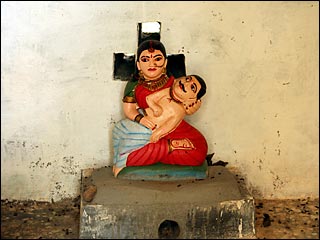 AOL News reports that the ancient Indian practice of "sati" [or "suttee"], burning widows to death at their husbands' funerals, has been revived in modern India.
AOL News reports that the ancient Indian practice of "sati" [or "suttee"], burning widows to death at their husbands' funerals, has been revived in modern India.While sati cases remain rare today, and India normally only has one every year or so, recent months have seen a surge: At least three widows have died on their husband's pyres since August, and another was stopped from burning herself to death when villagers intervened.
Experts can find no explanation for the increase. It's possible that media reports and word-of-mouth lead to a copycat effect.
But across rural India, it's easy to find people who revere sati as the ultimate demonstration of womanly honor, devotion and piety. Thousands of sati temples have been erected over the centuries, many carefully preserved and still in daily use.
And that's just the tip of the iceberg.
Women's issues are a big concern. Thousands of young brides are believed to be killed annually in dowry disputes, and statistics indicate that in a society that prefers to have boys, the aborting of female fetuses has left the country with 10 million "missing" girls. It's not all about education and modernization: Some of the country's wealthiest communities have the biggest imbalances.
And, despite official prohibitions, sati is honored by the rural poor. Witness this description of a recent burning of a woman named Bai:
No one in Baniyani will admit to having joined what quickly became a parade to the funeral pyre, or to having seen Bai burn. They're too afraid of the police. But many say they listened to the crowds, and heard stories afterward from neighbors who watched.
"The minute she said she wanted to be a sati, everyone came from here and nearby villages," said Ram, the elderly villager. "There must have been at least 200 people, maybe 300."
Chanting filled the village's narrow dirt roads: "Sati mata ki jai!" - "Glory to mother sati!"
Then Bai climbed onto the funeral pyre, took her husband's head in her lap, and went - painlessly, they insist - to her death. To some villagers, the act made her a saint, to others a goddess. Most everyone here worshipped what she had done.
"India has changed, and people should not do sati now," said Bali. "But if you do commit sati, you have courage ... You have gone from a normal person to superhuman."
Oh my!
Read it here.
No comments:
Post a Comment